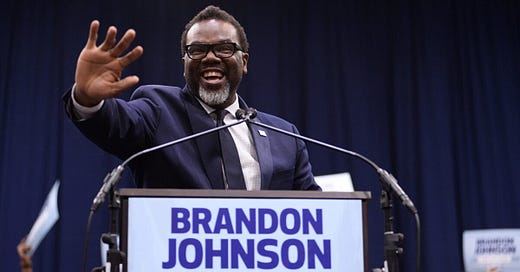Launch a mayor's task force on debt elimination
Johnson should develop a SWAT component to address the city's finances
One mistake voters repeatedly make regarding elections is we believe the person we put into office has a better skills set than the person we voted against. We also behave as though the victor in an election becomes endowed with wisdom and insights that that person didn’t have prior to taking office. We are seeing this with the ascent of Brandon Johnson to Mayor of Chicago.
When we are honest and realistic with ourselves being a school teacher and/or a community organizer are jobs that don’t require many skills beyond patience and common sense. However, being mayor demands a tool kit of skills that lend themselves to problem-solving, fiscal management, economic development and an array of others. Staying in that honesty lane, we must also acknowledge Mayor Johnson lacks the majority of those things. It is not a slam against him-it’s just his reality, as was his predecessor’s.
No doubt many will say he can acquire that expertise as he grows into the office. The problem is Chicago is in crisis mode and there really is no time for Johnson to learn on the job and be effective.
On day one of his administration we were at the point that Johnson should have publicly admitted his limitations and identified the best way as mayor he could help all of Chicago. And that way was to establish the Mayor’s Task Force on Debt Elimination. Such a body could be patterned after President Barack Obama’s Task Force on 21st Century Policing where some of the best minds in the country were assembled to address the growing problems between Black and minority communities and police across the country.
When Mayor Johnson took office he was aware that Chicago was financially strapped with both a general fund deficit and a debt to the city’s pension funds that was more than 44 states owed their pension funds. In short, he inherited a financial scenario that is billions of dollars in the red. There is no clear cut way of even halving that, much less eliminating it.
Recently an months-long investigative report by ABC-7 Chicago’s Chuck Goudie revealed that Chicago taxpayers may be on the hook for up to $1 billion beyond the above numbers due to wrongful conviction lawsuits. The city has a history of fighting lawsuits by indivudals who were arrested by CPD officers, imprisoned and ultimately found innocent. According to the report, most of these men would have been willing to settle for a fraction of the millions juries ultimately awarded them. Click here to read Chuck Goudie's story
That is all the more reason Johnson needs to reach out to the corporate and business communities and identify members to serve on such a task force as mentioned earlier. It has to be a cohort void of political ambitions or axes to grind. It is obvious when the city does better, businesses do better and residents benefit from both.
While the President’s task force contained 11 members, surely a mayor’s task forxw could be effective with seven members and a couple of ex-officio members. Read the task force's final report by clicking here
If Chicago is ever going to get a handle on its finances it is imperative that city officials get the assistance of someone who is accustomed to dealing with these huge amounts.
Candidates campaign on easy-to-digest issues such as public safety and more cops, economic development in underserved areas and improved schools; in part because budgets and deficits are tougher to explain as well as understand. What we all should attempt to understand is that the success of all campaign promises and/plans are rooted in the budget.
When a city overloaded with financial deficits goes to sell bonds it must promise to pay a higher than normal interest rate. Making good on those bonds means the payments to bondholders come from more of the taxes residents and businesses pay. That translates into fewer dollars for the city’s coffers. It also leads to some improvements being put on hold indefinitely. Ultimately the improvements must be made and because they were postponed, generally they wind up costing more.
The more spent on bond interest payments means there is less money to hire more cops, support development projects or invest in school improvements. The lower the deficit the smaller the interest payments and the more money a city gets to keep and pay for changes.
Johnson has proposed a series of tax increases to reduce the deficit; however, no level of increases that residents and businesses can pay will make a serious dent in the billions owed the eight city pension funds. If the mayor doesn’t put into place some semblance of outside financial expertise Chicagoans will continue to wallow in municipal debt. And the city known for its big shoulders will look like the city with stooped shoulders.






